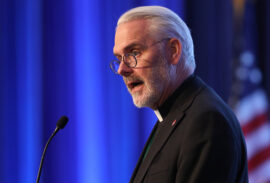
WASHINGTON – Hours after Oklahoma executed 51-year-old Jemaine Cannon July 20, Oklahoma City Archbishop Paul Coakley urged “all people of goodwill to join me in advocating for an end to the death penalty in Oklahoma.”
In its place, he called on state officials to work toward “actual justice that respects human dignity and prioritizes healing the wounds of grief and loss.”
The archbishop, who has frequently spoken out against capital punishment, issued a statement posted on social media describing the death penalty as an “archaic punishment” that “deprives the condemned of their inherent human dignity and is fundamentally at odds with the culture of life the State of Oklahoma proclaims to be building.
“The sanctity of life does not disappear after the commission of a crime — even a heinous one,” he added.
The archbishop also linked the life issues of opposition to abortion and capital punishment by noting that “a year after one of the biggest pro-life victories in the country, the overturning of Roe v. Wade, the state of Oklahoma is imposing the death penalty on Jemaine Cannon.”
He also asked for prayers for the victim, Sharonda Clark and her family and prayers for Cannon, his family and the corrections staff involved in carrying out the execution.
Cannon was given a lethal injection at 10 a.m. and was pronounced dead 13 minutes later at the Oklahoma State Penitentiary in McAlester. It was the second execution in the state this year and the ninth since the state resumed lethal injections two years ago.
Cannon was convicted of stabbing Clark to death with a butcher knife in 1995. She was a 20-year-old mother of two who Cannon had been living with after his escape from a prison work center weeks earlier where he had been serving a 15-year sentence for the violent assault of another woman.
A federal appeals court July 19 denied Cannon’s last-minute appeal seeking a stay of execution for his claim that as a Native American he was not subject to Oklahoma jurisdiction. The Associated Press reported that when he was asked if he had any last words he said: “Yes, I confess with my mouth and believe in my heart that God raised Jesus from the dead, therefore I am saved.”
Cannon was executed the same day that Alabama executed James Barber for the 2001 beating death of a woman. It was the state’s first execution since a pause on capital punishment in Alabama was lifted in February.
In a letter to Alabama Gov. Kay Ivey, faith leaders in the state, including Catholic priests and women religious, urged an end to the use of capital punishment.
“How can we claim to be a state that values human life at all stages if we continue to devalue life in this manner?” the letter said. It also stressed that the death penalty “precludes the possibility of redemption.”

